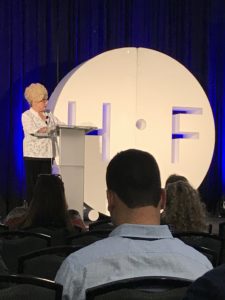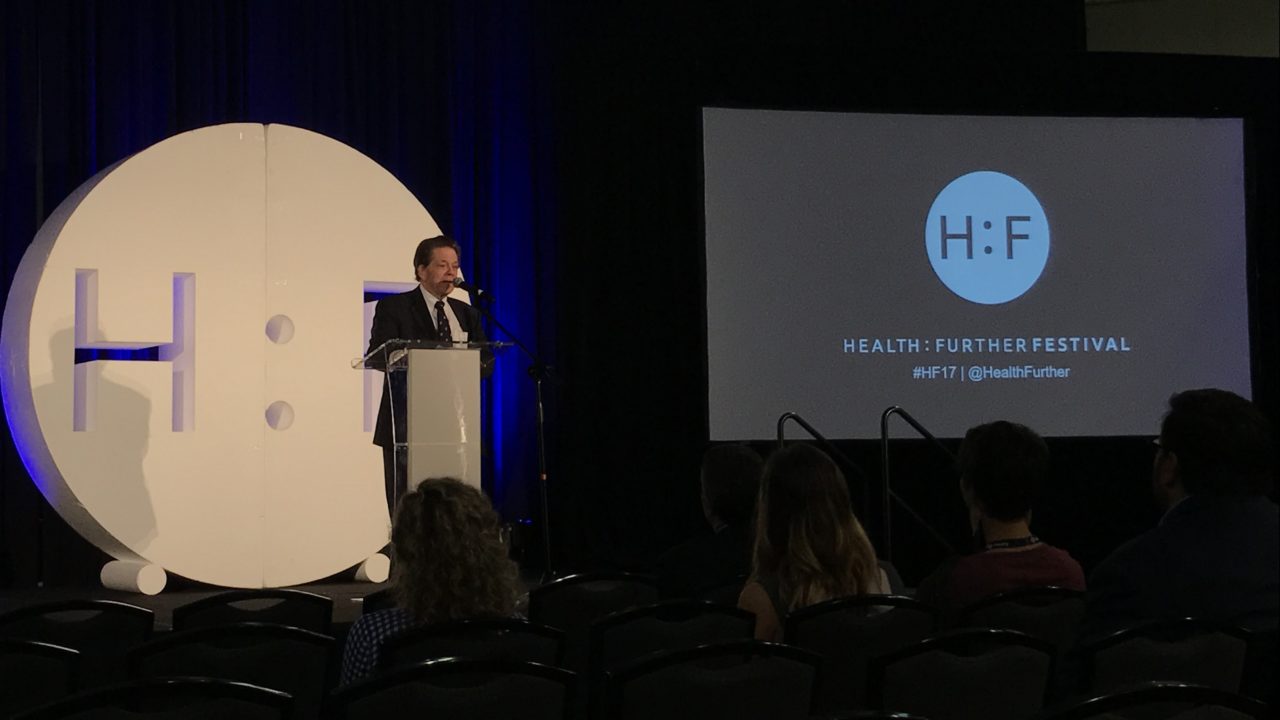By Kara Sherrer
After two days full of outside experts, Thursday at Health:Further revolved entirely around the health care industry, with a speaker slate heavy on providers and other authorities. In addition, the winner of the pitch competition was announced: Twiage, a dashboard that seamlessly relays real-time data on incoming ambulances and patients from EMS to hospitals. Twiage earned an opportunity to speak at the closing plenary sessions, promotional support from Health:Further, and a chance to work with Healthbox, a Chicago-based accelerator focused on innovative solutions for healthcare.
Theme(s) of the day
While the past two days have emphasized other industries, Thursday turned inward and focused on big health care names: HCA, Blue Cross Blue Shield, the FDA, the Department of Health and Human Services (HHS), and more. Politicians, providers, and physicians all spoke on the regulatory and political climate, as well as the laws and policies that companies large and small must navigate.
Power players
Kelly Nye of HCA, David Murray of Blue Cross Blue Shield of Michigan, and Mark Lange of Reputation.com participated in tactical panel about how physicians and hospitals can manage their brands online. As they pointed out, patients are most inclined to rate providers when they are unhappy, lowering ratings and the revenue curve. To mitigate this effect, providers should proactively request ratings to get a more representative sample.
Stephen Konya III, Senior Innovation Strategist for HHS, discussed various pieces of federal legislation and how they impact health care innovations, particularly in the realm of health IT. Economist Art Laffer praised Tennessee’s local policies — “I’m just so d*** proud I moved here,” and “The dream in America is to be like Tennessee” — before reflecting on federal policies. “What we need to do is bring in federal policies that do what Tennessee has done,” he said, before arguing that Obamacare was “a huge mistake” and claiming that the legislation will be repealed eventually.

Brenda Lee speaks about health care in the music industry
Singer Brenda Lee, aka Little Miss Dynamite, gave an inspirational speech about the need for more health care and insurance within the music industry. “There’s someone at every step of (my recording) process…who can’t afford health insurance,” she said. “It seems to me that health care shouldn’t belong to business and politicians. It seems that health care should belong to the people who use it and need it. It seems like financial health and physical health shouldn’t be dependent on each other.” She received a standing ovation from the crowd.
Key takeaways
Optimizing the flow of information for providers, physicians, and patients remained top of mind for many presenters on Thursday. Bob Gold of Gold Group Enterprises explained how providers can improve patient outcomes by implementing cognitive behavioral principles and combining clinical data with lifestyle state (information on the individual patient’s preferences and habits).
Keith Smith MD, Medical Director of the Surgery Center of Oklahoma, discussed another key area of information access: price transparency. Years ago, Keith published the price list for all the services offered by his center; over time, other facilities in the area have been forced to match his prices to stay competitive. Smith hopes that his radical price transparency can serve as a model for other facilities, as well as evidence that price transparency can help drive down medical costs in the real world.
It’s not about second options, it’s about seventh options. How do we make that happen? – Scott Hamilton
Olympic gold medalist Scott Hamilton, a former competitive figure skater who has survived both testicular and brain cancer, urged listeners to become more actively involved in their health care decisions, as he was forced to during his cancer treatments. “It’s not about second opinions, it’s about seventh opinions, he said. “How do we make that happen?”
Can’t get over it
Former practicing physician Brian Fengler, founder of EvidenceCare, shared a surprising statistic — only 20% of care is evidence-based. According to him, most front-line providers are seven to 10 years behind the guidelines, since staying current would requiring reading publications for dozens of hours every single week. Most physicians are simply too busy trying to help as many patients as possible to stay up-to-date on the latest medical evidence, but this leaves them practicing with potentially outdated care guidelines.
While Fengler’s statistics make sense upon reflection, it is still jarring to consider them, especially given patients’ reluctance to question doctors’ decisions. After all, the medical system’s complexity (and expense) discourages patients from seeking alternative opinions, and most patients have never been to medical school, so they don’t feel justified in questioning their doctor’s advice. But if even the doctors are behind the times, how can patients receive the most updated care? Fengler started EvidenceCare to compile the latest evidence-based care findings in an easy-to-use portal, so doctors can look up information and make informed decisions in real time.
